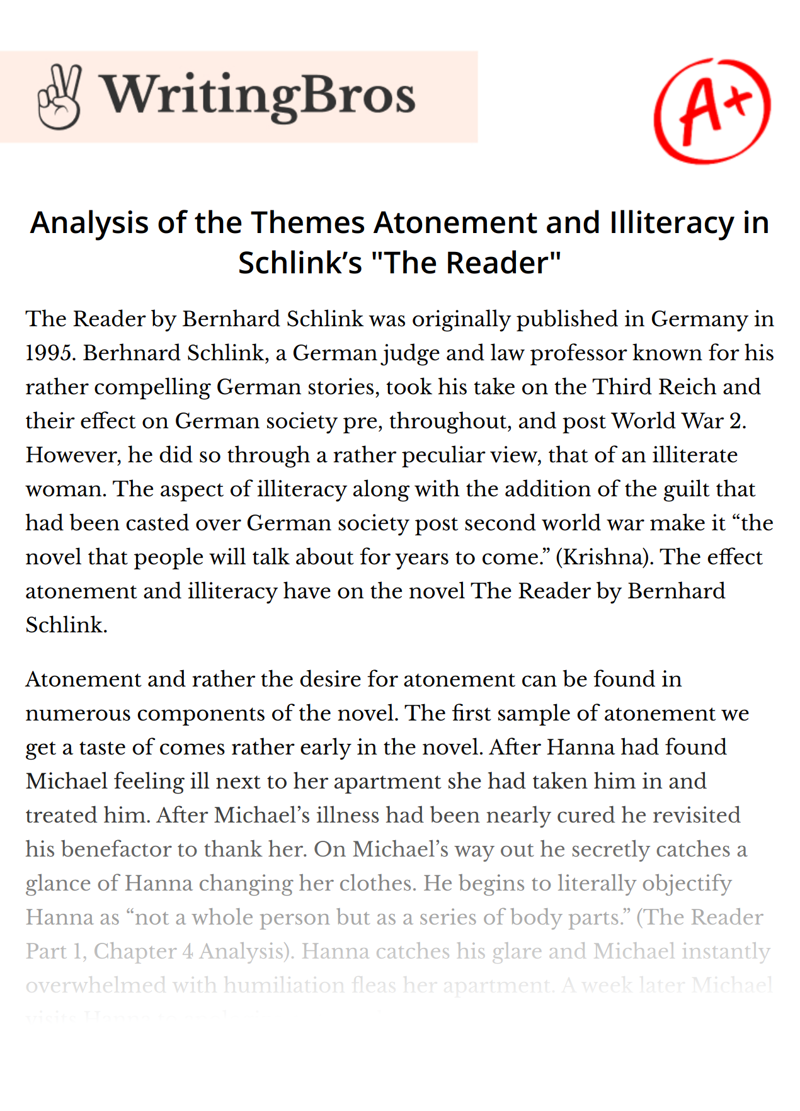Analysis of the Themes Atonement and Illiteracy in Schlink’s "The Reader"

The Reader by Bernhard Schlink was originally published in Germany in 1995. Berhnard Schlink, a German judge and law professor known for his rather compelling German stories, took his take on the Third Reich and their effect on German society pre, throughout, and post World War 2. However, he did so through a rather peculiar view, that of an illiterate woman. The aspect of illiteracy along with the addition of the guilt that had been casted over German society post second world war make it “the novel that people will talk about for years to come.” (Krishna). The effect atonement and illiteracy have on the novel The Reader by Bernhard Schlink.
Atonement and rather the desire for atonement can be found in numerous components of the novel. The first sample of atonement we get a taste of comes rather early in the novel. After Hanna had found Michael feeling ill next to her apartment she had taken him in and treated him. After Michael’s illness had been nearly cured he revisited his benefactor to thank her. On Michael’s way out he secretly catches a glance of Hanna changing her clothes. He begins to literally objectify Hanna as “not a whole person but as a series of body parts.” (The Reader Part 1, Chapter 4 Analysis). Hanna catches his glare and Michael instantly overwhelmed with humiliation fleas her apartment. A week later Michael visits Hanna to apologize or to make atonement for his wrong. Although very minimalistic we will see that this behavior heightens as the characters experience more together.
The most prevalent extract from the novel regarding atonement can be found in Part 2 of Chapter 4 where Michael, apart of a seminar, visits a trial in court once a week as a part of his studies. At one of the trials 6 Nazi women guards were being prosecuted for the malicious act of allowing a church to burn down with numerous inmates inside and not having allowed them to exit. Michael believes to see who appears to look like Hanna Schmitz but isn’t sure as they [quote]. Once the women are ushered into their designated spots and their names are said out Michael realizes that it was in fact his lover of many years, Hanna Schmitz. “I felt the numbness with which I had followed the horrors of the trial settling over the emotions and thoughts of the past few weeks.” (Schlink, p.160). Michael is speechless of the act Hanna has committed and to some extent is in disbelief.
Illiteracy is a cardinal aspect and theme in The Reader and is what distinguishes the novel from other post genocidal holocaust novels. It brings forward an aspect like no other. This aspect resides through the life of 36-year-old former guard at Auschwitz Hanna Schmitz. Having being illiterate her whole life it limits her not only to career paths but also to her understanding of her life choices, in specific her recognition of her actions in the holocaust. Hanna may be illiterate in terms of reading and writing but because of her absent parents, and blank in a way she is illiterate to situations. Meaning, she had never been introduced to different morals or even blank and it explains the reasoning for many of her actions such as, her unsavory relationship with a 15 year old Michael Berg. Hanna’s illiteracy was disclosed at the beginning of the novel, but we, the readers progressively began to get hints. The first sense we obtained of her being in fact illiterate was when Michael began to read to Hanna his novels prescribed for school.
In conclusion, the use of illiteracy and atonement as literary aspects in the novel. The Reader by Berhnard Schlink introduced a new approach to analyzing German society post world war 2. It revealed much about the relationship between characters such as Michael and Hanna but at the same time gave a voice to … “By finding the courage to learn to read and write, Hanna had advanced from dependence to independence, a step towards liberation.” (Schlink, p.188)
'I... I mean... so what would you have done?' (Schlink, p.111)
“The feeling of guilt that had tortured me in the first weeks gradually faded. I avoided her building, took other routes,” (Schlink, p.87)
“It was like being a prisoner in the death camps who survives month after month and becomes accustomed to the life, while he registers with an objective eye the horror of the new arrivals: registers it with the same numbness that he brings to the murders and deaths themselves.” (Schlink, p.101)
"
The Interaction Between Children and Their Imaginary Guardians in Literature,Winnie The Pooh by A. A. Milne,Children,Mental Disorder,,academic,1493,3,24,14/12/2020,
This section aims to discuss the use of characters introduced to children through book illustrations and how these can become much more than just a scribble on a page. An illustrated character has the capability to become a friend to a child just as much as any other human
Cite this Essay
To export a reference to this article please select a referencing style below

